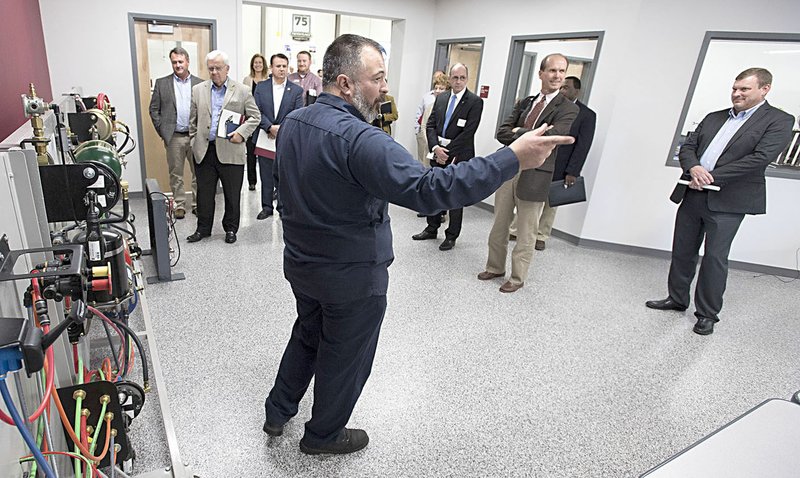GENTRY -- Arkansas should do more to encourage the kind of flexibility and experimentation in its public schools that led to Gentry's new technical education center, legislators and other experts said Wednesday.
The newly created Legislative Task Force on Workforce Education Excellence, a group of legislators and others from around the state, gathered Wednesday afternoon to tour the Gentry School District facility that's now home to diesel technology and nursing courses for several districts' high school students. The task force also heard from a few dozen school and business officials from around Northwest Arkansas.
The group agreed on the need for vocational training early on for interested students is great and growing and programs such as Gentry's must grow with it.
"This is an example that will be used across the state," said State Rep. Dan Douglas, R-Bentonville, whose district includes Gentry.
Gentry's 13,000-square-foot Career and Technical Education Center opened in August, springing from a network of public and private cooperation. McKee Foods, maker of Little Debbie snacks and owner of a Gentry production plant, needs technicians for its vehicles and was already providing a mechanic to teach diesel courses, while several other companies helped provide the equipment in the center.
On the public side, Gentry, Bentonville and other districts provide a few dozen students. Northwest Technical Institute and Northwest Arkansas Community College help with instruction as well. Gentry voters kicked in a property tax last year to build the center and other facilities. And the state government allows mechanic and nursing instructors who don't have teaching licenses. Last year the Legislature voted to allow the multi-district cooperation that led to the center.
Christie Toland, Gentry assistant superintendent, said the program provides a path to careers for students that don't necessarily require a college degree, at least not right away.
"They are going into the workforce, or are preparing to go into the workforce, in a high-demand, well-paid job," she told the task force. She said one graduate from Gentry's workforce-aimed courses works at J.B. Hunt Transport while another's working to become a master electrician.
The cooperative workforce education model's becoming more common in the area. The institute and the community college provide courses for high school students around Washington and Benton counties. The Bentonville School District's Ignite program connects students with professional mentors in construction, information technology and other industries. And the Springdale Chamber of Commerce will hold its annual Workforce Summit on Nov. 15 to bring together companies and students from multiple districts.
Gentry High School last year also converted to a charter school, which has allowed it to introduce or expand programs in aquaponic farming, health professions and other areas, Toland said.
State Sen. Jane English, R-North Little Rock and the task force's co-chairman, noted the charter and multitude of waivers Gentry uses. The high school goes outside of the box of a typical school to provide training for the jobs private employers say they desperately need to fill, she said.
"I keep saying, if everyone needs a waiver, there's something wrong with the box," English said to murmurs of agreement around the room.
The Legislature created the task force earlier this year to look for ways "to produce an efficient, technologically-advanced technical and workforce education system," according to the legislation behind it.
Kathi Turner, deputy director for career and technical education at the state's Department of Career Education, said many schools look into converting to a charter school but realize they don't need to do so for the flexibility they want. The department can give permits for some less traditional instructors who are still working in their industries.
"So we're making some headway," she said.
Those in attendance gave other suggestions for possible state-level changes. Northwest Technical Institute officials said many of their programs are full and have waiting lists because the state-supported school can't fit them.
Starlinda Sanders, career and technical education director for the Bentonville district, pointed to a state Department of Human Services rule making it difficult to hire registered nurses with years of experience to teach entry-level certified nursing assistant programs in high school or college. Health care is one of the region's fastest-growing industries, and health systems have long said they need more people at every level of care.
"Every time we hit that kind of stumbling block, we're falling down on the job again," Sanders said.
General News on 11/08/2017
